Movie Review – Adventures Of Tintin, The: The Secret Of The Unicorn
Absolutely terrific animated film from Spielberg, with deft flourishes and that old action adventure yarn mentality harkening back to the days before Indiana Jones appeared in The Kingdom Of The Crystal Skull. Tintin, a long time favorite character of mine (and most of the worlds!) is born on the big screen thanks to state-of-the-art technology, a ripper script from Edgar Wright and Joe Cornish, and a terrific score from the irrepressible John Williams. Big on action, big on suspense, big on mystery, The Secret Of The Unicorn is just a big big adventure film begging to be enjoyed. Enjoy it.
– Summary –
Director: Steven Spielberg
Year Of Release : 2011
Principal Cast : Jamie Bell, Andy Serkis, Daniel Craig, Simon Pegg, Nick Frost, Toby Jones, Daniel Mays, Tony Curran.
Approx Running Time : 90 Minutes
Synopsis: A young reported is swept up on the search for a lost sunken treasure, together with his faithful dog Snowy, and a drunken sea captain named Haddock. Together, the trio must thwart the plans of a descendant of one of the Haddock family’s oldest nemesis, the pirate Red Rackham.
What we think : Absolutely terrific animated film from Spielberg, with deft flourishes and that old action adventure yarn mentality harkening back to the days before Indiana Jones appeared in The Kingdom Of The Crystal Skull. Tintin, a long time favorite character of mine (and most of the worlds!) is born on the big screen thanks to state-of-the-art technology, a ripper script from Edgar Wright and Joe Cornish, and a terrific score from the irrepressible John Williams. Big on action, big on suspense, big on mystery, The Secret Of The Unicorn is just a big big adventure film begging to be enjoyed. Enjoy it.
**********************
It’s been a while since I actually smiled during a Steven Spielberg film. The last time I outwardly smiled during a Spielberg film was during The Terminal, back in 2004. Since then, Spielberg’s not made a film with so much sheer cinematic energy as the first of an intended trilogy of films about Tintin, the young reporter renowned around the globe thanks to the pioneering comic work of Belgian artist and storyteller, Herge. No, not even Kingdom Of The Crystal Skull, which was, let’s face it, an exercise in CGI and Green Screen cash-grabbery. He’s made great films, of course (Munich, War Of The Worlds) but none since The Terminal have seen him return to that “adventure yarn” style he pioneered during the 80’s. Heck, you’d have to go back to the ill-toned Jurassic Park sequel to find him trying to capture that old magic. It’s no surprise Spielberg, and co-producer Peter Jackson, found a kinship with Herge’s adventuring reporter character; it’s pretty obvious that both Indiana Jones and Tintin represent similar traits and ideologies – both travel the world seeking treasures and solving mysteries, usually exotic locations, and become involved with seedy villains and death-defying escapes from danger. I guess it’s a kind of literary symmetry that Spielberg, who approached Herge during the 80’s for permission to work on a Tintin film, eventually helmed the first big-screen adaptation of the classic comic creation with which he held such an affinity.While Tintin is relatively unknown with the USA, elsewhere in the world he is massively popular, both culturally and in a literary sense. Most adults will have read, seen or been exposed in one form or another to Tintin, his canine companion Snowy, and the drunken anger-management-avoiding Captain Haddock, who have been published in comic form since the 1920’s. To save me the trouble of trying to give you a potted history of Tintin, I’ll just link to the Wiki page here. Read that, then come back here.
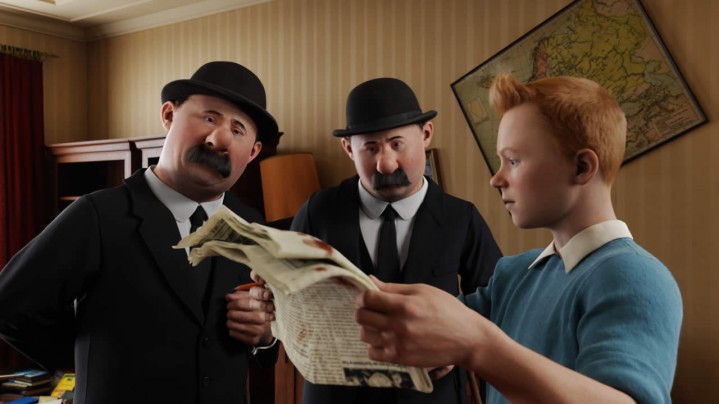
Right, now you’re up to speed, lets shunt forward to this film, known outside of the USA by it’s subtitle, The Secret Of The Unicorn. The film is actually based on two of Herge’s original books, The Secret of The Unicorn and The Crab With The Golden Claws, both of which were released in the 1940’s, while certain elements of a third book, Red Rackham’s Treasure, were lifted to complete the tale. The script, originally crafted by current Doctor Who showrunner Stephen Moffat and honed by director Edgar Wright (Hot Fuzz, Scott Pilgrim) and his scripting cohort Joe Cornish, meshes the intertwining narratives of Herge’s two books into one cohesive whole, merging characters, set-pieces and ideas from across the Tintin universe and bringing them convincingly together as one film. The film not only had to set up the world of Tintin, and introduce us to both the titular star and his canine companion, Snowy, but also to the series third major protagonist, Captain Haddock. It had to traverse continents and cultural boundaries, as well as keeping up the mystery of discovery so synonymous with the Tintin books, and I think the film does that exceptionally well.
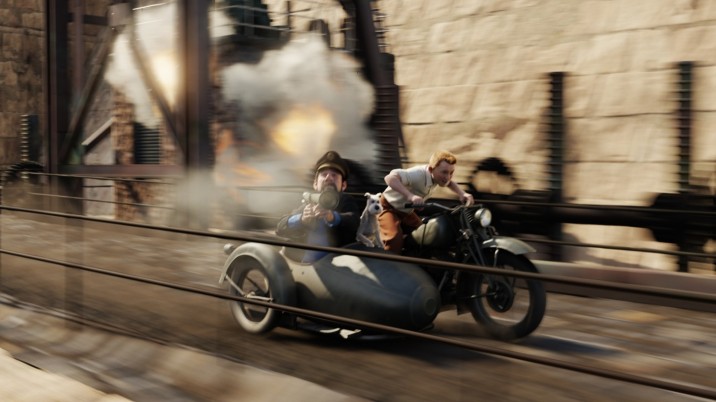
Is it just me, or did you find yourself slightly aroused at the prospect of Steven Spielberg and Peter Jackson working on the same film? I damn near spontaneously ejaculated the day I heard that was happening, and on Tintin no less. Sorry for the graphic mental image, but the thought of two of Hollywood’s heavyweights working on a single project, an animated motion-capture project, no less, filled me with a giddy, geeky glee I’d not felt since hearing Jackson was making The Lord Of The Rings back in the mid-90’s. Spielberg, who marks Secrets Of The Unicorn as the first animated film he’s directed, makes the transition to full CGI over live-action with apparent ease, even though he still seems to approach the medium with a live-action mentality. I guess it’s served him well all these years, so why not stick to what you know, right? Together with Jackson and the continue-to-astonish team over at WETA Digital in New Zealand, Spielberg brought one of my all-time favorite literary creations to life in a full blown animated feature (be aware, there were a number of lower budget animated and live-action attempts to bring Tintin to the mass public awareness in the 60’s) the likes of which we’ve been dying to see all these years.
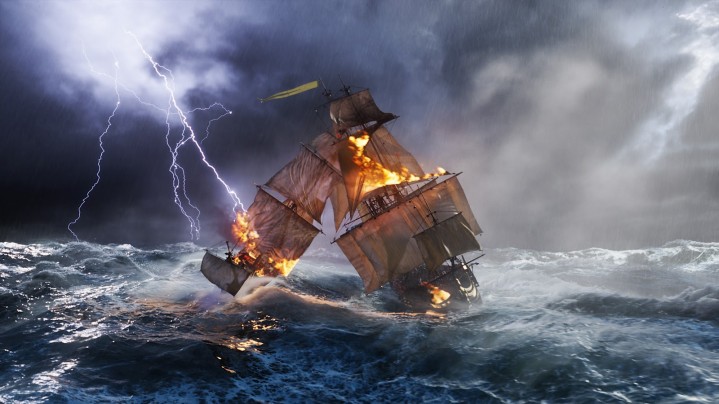
The story the film tells involves young reporter Tintin (performed by Jamie Bell) living in an unnamed European town (possibly French) with his Fox Terrier dog Snowy, who is caught up in the intrigue of the importance of a model ship he finds in a flea market. Immediately after purchasing the beautiful model ship, known as The Unicorn, he is accosted by strangers looking to buy it off him – Tintin refuses, however you get the sense that these men won’t take no for an answer. And they do not, with Tintin learning through various messages that the boat is one of three known to exist which will lead to a long lost sunken treasure – a treasure now pursued by a man known only as Sakharine (performed by Daniel Craig). When he sneaks onto Sakharine’s boat to follow him to locate another Unicorn, Tintin meets the drunken, belligerent captain of the vessel – who’s been locked in his cabin after the crew mutinied – Captain Archibald Haddock (performed by Andy Serkis). Together with Haddock, whose family history has direct ties with the sunken treasure and the ancestry of Sakharine himself, Tintin and Snowy circle the world to find the next key to unlocking the whereabouts of the treasure indicated by a scroll hidden within his Unicorn’s mast.
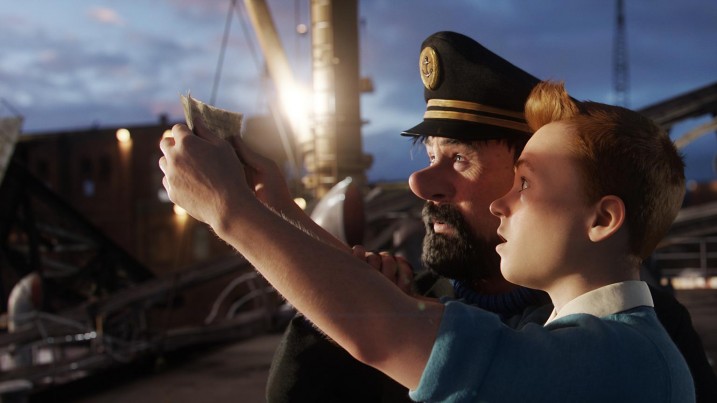
For those of you reading this who’ve seen the movie but are yet to pick up a Tintin book, may I humbly suggest getting off your ass and doing so as immediately as humanly possible. It’s criminal that there’s certain sections of the world where Tintin is not a cultural touchstone. Spielberg has, in my humble opinion, pulled off the near-impossible: he’s actually brought Tintin and his world to magnificent, breathing, exploding life. That’s not to say Tintin is without flaw, because there’s certainly elements of the film which could have been worked on for improvement’s sake, but as far as simple escapist entertainment goes, I don’t think Spielberg has done this well in decades. It’s a fun film, a film not trying to do anything other than entertain, and Tintin does exactly that. There’s elements of a grand adventure, elements of a crime-thriller, elements of slapstick comedy (most of which actually is the films major failure) and elements of a noirish mystery, all sloshing together in Spielberg’s massive cauldron of cinematic escapism, and it’s only a brave director (or a director with the balls like Spielberg) who could pull this off with any kind of integrity. It’s the kind of film Renny Harlin wishes Cutthroat Island had been.
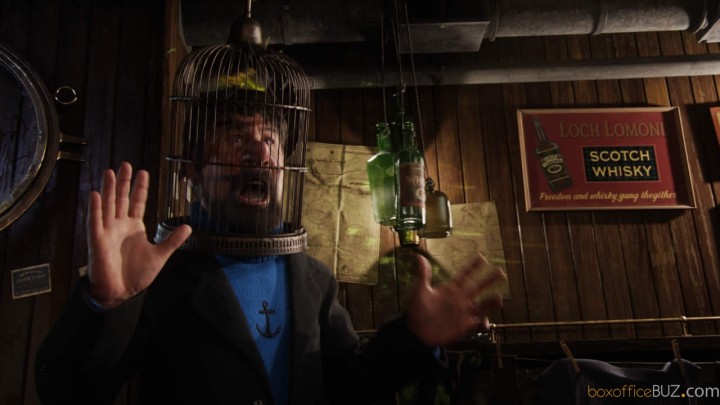
The cast are all really very good, only superseded by WETA’s amazing animation of those captured performances. Ever since Robert Zemeckis unleashed The Polar Express to the world, I’ve held performance capture at a distance as an art-form still somewhat unreliable of manifesting a decent avatar of humanity by which we’re transported to that world; with recent efforts in films such as Rise Of The Planet Of The Apes, I’ve had to change my tune on performance capture (or is it still Motion Capture? I never know these days!) because the level of technology is so good now, that it’s hard to tell the difference between reality and fantasy. Tintin isn’t designed to be a full scale reality in the sense that the world presented is a carbon copy of our own – it’s a heightened world of adventure fantasy; where villains dress in black and stomp around to brassy underscores, while the hero wears casual 3/4 pants, a trench-coat and a sky-blue sweater and isn’t beaten into a pulp by Manchester United fans. As such, the representations of Tintin, Haddock and the rest of the human cast aren’t meant to be realistic to our eyes, but as close to a representation of Herge’s original drawings brought into the 3D realm of CGI animation as possible. Where the human performances of Jamie Bell, Andy Serkis and the rest finish and the digital animation begins is hard to see – actually, it’s impossible to see, this film is so utterly seamless.
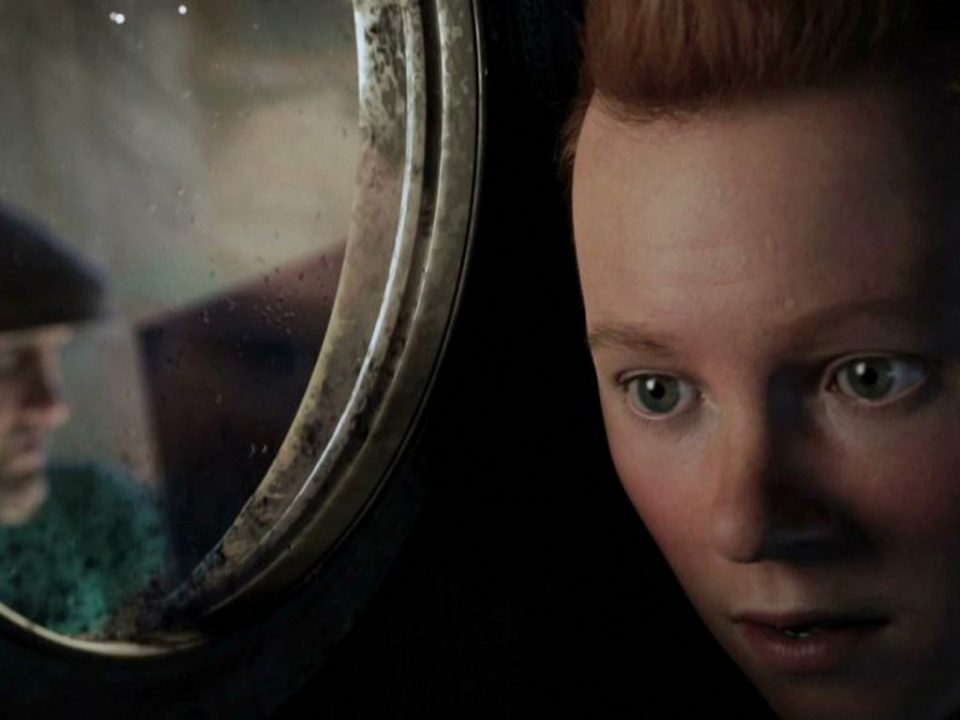
Jamie Bell provides a pretty close approximation to what I’d imagined Tintin would sound and act like were he to be real. His accent is spot on, his mannerisms and genuine morphing into the role is magnificent, and he’s more than ably backed up by Performance Capture God himself, Andy Serkis. Serkis has become the go-to guy for this kind of thing, probably because he’s been doing it since the concept was practically invented with Gollum’s digital creation. Serkis delivers Haddock with a Scottish accent (a creative decision I wasn’t prepared for, but have come to agree with as being a pretty good choice), while comedy legends Nick Frost and Simon Pegg (who worked together on Hot Fuzz, Shaun Of The Dead, and Paul, among others) doing the roles of bumbling Interpol agents Thomson and Thompson. Thomson and Thompson are supposed to be the comedy relief in this film, and while I can’t argue with Pegg and Frost’s comedic pedigree, I felt they were given so little time to fit into their roles, and so little actual comedy to do, that their impact on the film was reduced considerably. I actually found Haddock a funnier character than these two moustachioed detectives, which was a shame considering how amusing they are in Herge’s original books. If there’s a single weakness to the entire film, I think this was it. It’s a minor issue, or major one depending on whether you were expecting Frost and Pegg to be funnier, but the script didn’t give them room to breathe as characters.
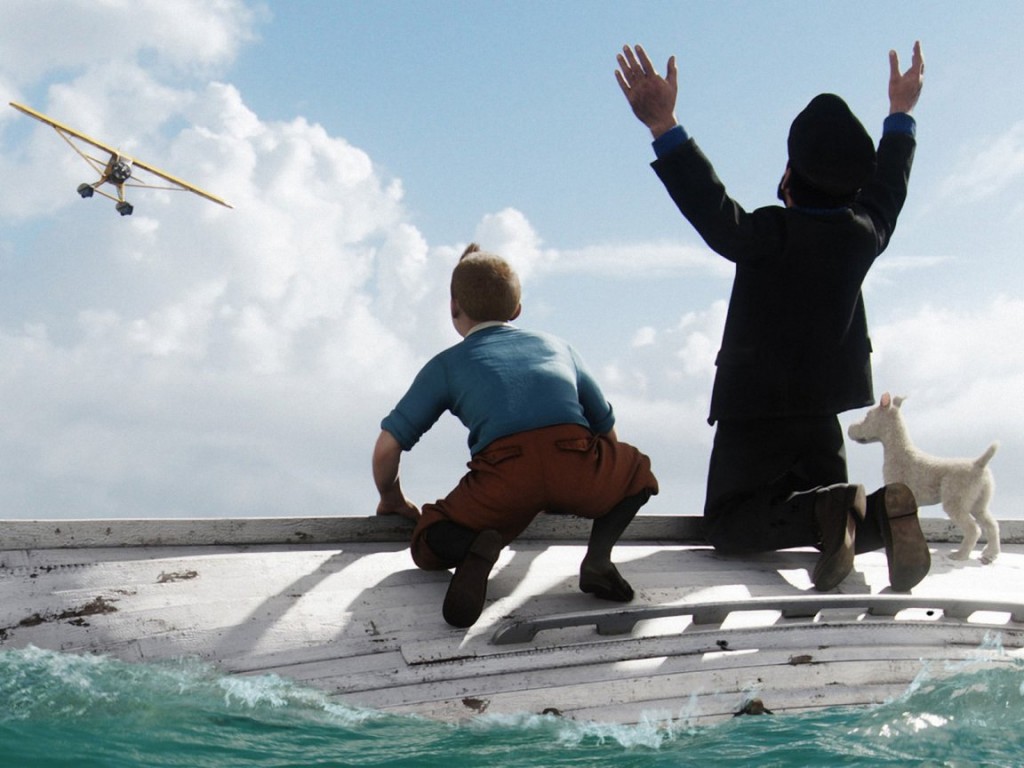
Central villain, Sakharine – who also doubles as the “historical” Red Rackham in one of Haddock’s ancestral flashbacks – is given evil flourishes thanks to a great performance by Daniel Craig. Craig sinks his teeth into what was a fairly banal central villain, to be honest, and delivers vastly more impact in the role than I was prepared to credit. I was a little flabbergasted with the rather ignominious exit to his character at the conclusion of the film, I’ll admit, but I think there’s just enough ironic humor in Haddock’s battle with him – and the eventual outcome – that it works for the film, rather than against it. Stunt casting in Toby Jones as a toffy pickpocket whose influence on the film is marginal at best, even though he’s in the opening twenty minutes or so of the movie quite a lot, and appears random and ill-defined. Why this Silk character is even in the film seems baffling since he has little to do with the overall outcome, and after his arrest in the opening is never seen again – I’m not sure why a talent like Toby Jones was needed for the role, but I’m always glad whenever he makes an appearance in any film. Plus, it’s a hundred times better than what he had to do in Your Highness. One of my favorite Brit actors, Daniel Mays, plays a henchman of Sakharine, while Scottish actor Tony Curran is wasted as a cameo appearance at the start of the film – Delacourt.
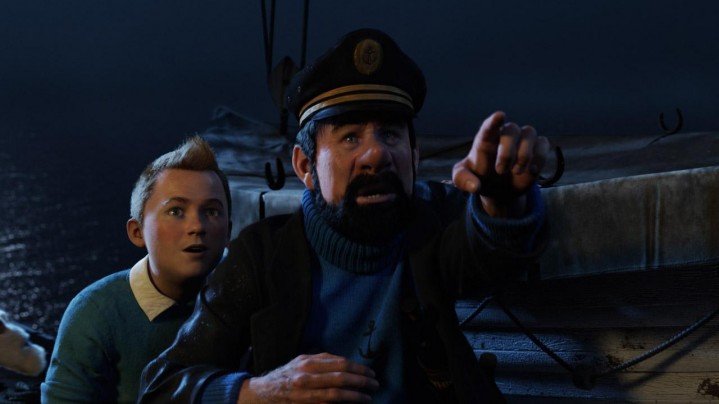
Where the film succeeds enormously is in its breathless sense of adventure and scale. We’re thrust into all manner of vehicles for transport and combat (can you believe two shipping cranes are used in one particular battle sequence!) in order to move the story around the globe – from Europe to the Sahara and Northern Africa, to the open ocean on board Sakharine’s seconded vessel, to the overgrown grounds of the Haddock family home, Marlinspike Hall; Tintin isn’t a film set in a single locale, and Spielberg exemplifies this kind of widescreen epic storytelling best of all. A telling sequence is Tintin and Haddocks escape from an overflowing dam through the Arabian town of Bagghar (don’t try and Google it, it doesn’t actually exist), where Spielberg uses the “single camera shot” method made digitally famous by Zemeckis to follow our characters down the side of a mountain and through a town trying to catch three pieces of parchment from the claws of a villain – it’s breathtaking and exhilarating, and establishes the mood of the entire film in a single, five minute piece. Vintage Spielberg, indeed. The film also brings some pretty action packed moments of more intimacy, especially as Haddock and Tintin (as well as Snowy, don’t forget) try and escape Sakharine’s vessel, clambering around the ship dodging gunfire and explosions and some pretty hard hitting punches. It’s all very PG, of course, but it’s a pretty hard edged PG at times.
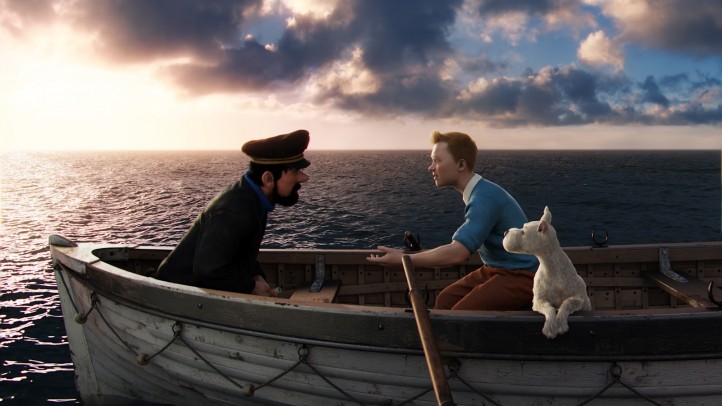
Of note too is the terrific orchestral score by John Williams – from the jazzy 20’s flavored opening titles theme to the more bombastic action moments, Williams scores the shit out of this film and knows it too. He hits every emotional beat and every action kapow with the ease of a seasoned pro – God, he’s been doing this since before I was born! – and while none of his themes are especially memorable, at least compared to his work on previous Spielberg outings like Raiders, Jurassic Park or Jaws, you can sense how easily it all fits with what’s happening on screen, and it suits the story so effortlessly. Williams’ work here is a pure joy.
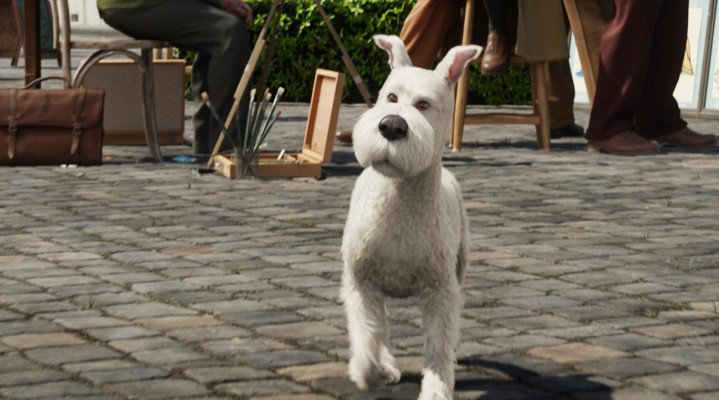
The Adventures Of Tintin: The Secret Of The Unicorn is a cumbersome nomenclature for what is, essentially, a fairly simple adventure story. The character aren’t especially developed beyond what Herge provides details for (as admitted by Spielberg in an interview on the subject) but the point of the film isn’t the characters as such, but the story they’re involved in. The script rips along at an incredible pace, with Spielberg helming this baby so proficiently and skillfully you’d think he’s been doing animated films for years. The story is filled with wonderful little nuances, nods to other Tintin adventures, as well as a quite obvious tip-o-the-hat to Jackson’s most cult-classic film (you’ll notice it by the mention of Sumatra somewhere in the film…. hint hint) and the sheer abundance of fun and joy to be had simply by inhaling Tintin’s brisk, action-packed musk. It’s an adventure film first, most and last. Critically pointed flaws such as a lack of character depth or any kind of moral or ethical undertones should be ignored as meanderings of folks looking for something to notice: Tintin should be enjoyed for the elegantly shot, singularly enjoyable theme-park ride it actually is. A pure popcorn muncher, Tintin is a wild, wild ride, and I for one can’t wait for the sequels.
What others are saying about The Adventures Of Tintin: The Secret Of The Unicorn:
Dan The Man found it problematic: “The problem with this frenetic feel that Spielberg gives this flick is the fact that it is almost way too highly-energized and it feels as if Spielberg was just doing this to get away from the fact that the story itself is a little uneven.”
Sam over at Duke & The Movies starts his review like this and never lets up: “What a delight The Adventures of Tintin is. Directed by master craftsman Steven Spielberg this exciting and jubilant rollercoaster ride of a film is a well-welcomed surprise, guaranteed to please audiences of all ages.”
Will at Silver Emulsion found it hard to connect with the film: “While the globe-trotting adventure is one of my favorite styles of film (thanks to Indy) and the action sequences are fairly enjoyable, what Tintin lacks is heart. The animation looks incredible and unbelievably life-like, but without any real character development I couldn’t connect with anyone in the film.”
Nostra at My Film Views puts it simply: “If I had one criticism about this movie is that it was over way too soon and can’t wait to see the next installment.”
Stevee at Cinematic Paradox loved it except for one tiny thing: “If there was one little niggle I had with the story that the script-writing team executed, it would have to be the fact that when you look at the bigger picture, the story is virtually meaningless. The adventure that Tintin went on was not one that was going to change the world in any way shape or form, and if the team didn’t succeed it would only really be a personal loss.”
Vic over at The Movie Brothers loved it: “Jackson and Spielberg supplies us with one stunt filled action sequence after another. Displays that can only be seen in this other-world dimension of animation. Displays that no live action cameras can capture on location. It never comes across as cartoony or naive”
Got a different opinion? Think this film is total crap and want to tell the world? Let us know what you think in the comments section below!!

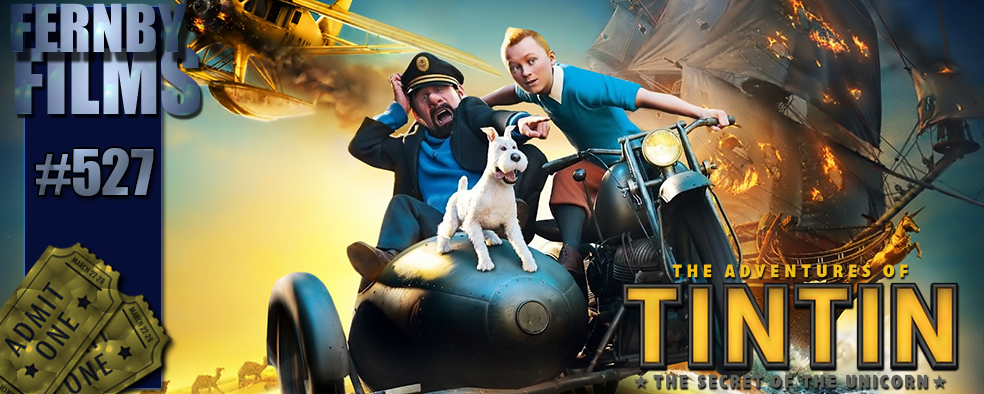

Another Tintin movie would be awesome
As you saw in my review, I thought it was entertaining but that was pretty much it. It felt like Spielberg was trying a little too hard for something here and somehow came up short. Still, I had a bit of a fun time with this one none the less. Good review Rod.
My recent post Halloween Horror Movie Month: 28 Weeks Later (2007)
Thanks, Dan. I had fun with it too, even if there were some wobbly bits! 😀
I have to admit I was dazzled by Tintin, saw it on blu-ray and it looked great. The visuals are fantastic. And I was thoroughly entertained by a good mystery that only loses its way towards the end. Another good addition to Spielberg's CV.
My recent post Top 10 James Bond Opening Credit Sequences
Too true – both this and War Horse are both worthy entrants into his filmography. Thanks Dan!!
Will you hate me forever if i tell you i hated this movie? I turned it off after 45 mins as I was bored to tears!!
My recent post Cinema Review – Frankenweenie
This comment is almost worthy of causing the revocation of your official Film Critic Card. Bored? Obviously somebody didn't read the books this film was based on……
Why would I read anything FRENCH????? LOL
i really got into this one as well. Good, solid entertainment. Like your writing.
My recent post Are You Octoberfest Drunk? An Online Quiz
Awww shucks, you're too kind, my friend.
Always fun reading your own words some time later, surprises me everytime 😉
Nice to read you enjoyed this one a lot as well, excellent review!
My recent post Sound of My Voice (2011)
Thanks Nostra, always happy to link to another writer's work!!